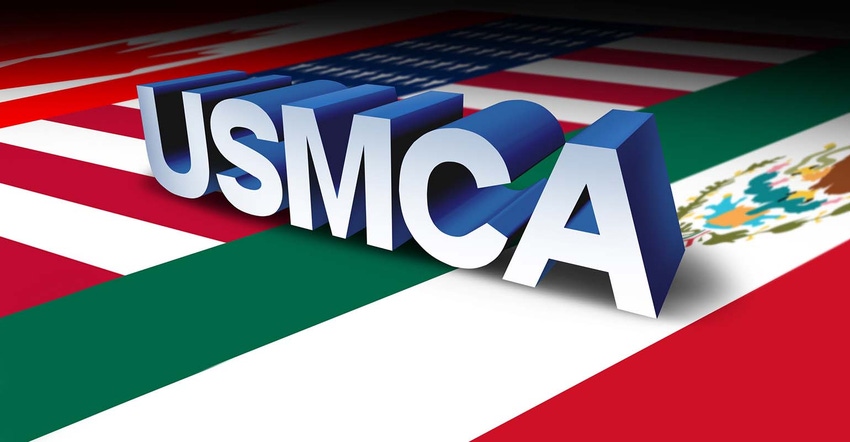Legislative Watch: Congress please ratify USMCA; China tariffs next; Trump disagrees, threatens Mexico again; Trade Advisory Committees named; Kansas City gets ERS, NIFA.

There is strong support in the agricultural community for Congress to pass the U.S.-Mexico-Canada Agreement. In a letter to Congress, 965 national, state and local agricultural organizations and businesses called on Congress to ratify the USMCA.
The letter stated, “Over the last 25 years, U.S. food and agricultural exports to Canada and Mexico have more than quadrupled under NAFTA – growing from $9 billion in 1993 to nearly $40 billion in 2018 and helping to support more than 900,000 American jobs in food and agriculture and related sectors of the economy. USMCA builds on the success of the NAFTA agreement, makes improvements to further enhance U.S. food and agricultural exports to our neighbors, and would deliver an additional $2.2 billion in U.S. economic activity.”
Those signing the letter included the American Farm Bureau Federation, American Seed Trade Association, American Soybean Association, Animal Health Institute, Farm Credit Council, Food Marketing Institute, National Association of Wheat Growers, National Cattlemen’s Beef Association, National Corn Growers Association, National Cotton Council, National Council of Farmer Cooperatives, National Milk Producers Federation, National Pork Producers Council, National Turkey Federation, North American Meat Institute and USA Rice.
China tariffs up next
Now that the tariff issue with Mexico has been settled for the time being, next up is the possibility of President Trump putting tariffs on an additional $300 billion of Chinese goods.
President Trump has said he would wait until after the G20 meeting on June 28 and 29 in Japan before he makes the decision of additional tariffs. He plans to meet with Chinese President Xi Jinping during the G20 meeting.
U.S.-Mexico deal doesn’t include additional ag purchases
President Trump has claimed that the U.S.-Mexico agreement last Friday includes additional agricultural purchases by Mexico. Mexico claims this is not the case.
Mexican Foreign Minister Marcelo Ebrad said, “We don’t have a specific agreement on (agricultural) products.” Ebrad said Mexico is one of largest buyers of U.S. agricultural products and it will improve as long as there are no tariffs in place.
At a House Agriculture Subcommittee hearing this week, Ted McKinney, USDA Under Secretary for Trade and Foreign Agricultural Affairs, and Gregg Doud, USTR Chief Agricultural Negotiator, said they didn’t have any information about such a deal when asked about Trump’s claims of more purchases by Mexico.
Trump threatens Mexico Again
President Trump tweeted on Monday that if Mexican lawmakers fail to sign an immigration and security deal, tariffs on the country will be reinstated. Trump added, however, that he does not expect a problem with the vote in Mexico. This comes days after Mexico and the U.S. announced an agreement on immigration, in which few details were provided.
Mexico has 45 days to prove to the administration its efforts to stop the flow of migrants entering the U.S. are working. If the U.S. believes the plan is not working there would be additional on a “safe third country” asylum deal. Tariffs could return if the administration doesn’t believe Mexico’s efforts are working.
Last month, Trump threatened 5% tariffs on Mexican goods, which would have increased every month until they reached 25% in October, unless Mexico stopped illegal immigration across its border with Mexico.
USDA-USTR Trade Advisory Committees named
Secretary of Agriculture Sonny Perdue and U.S. Trade Representative Robert Lighthizer announced the appointments of 140 private-sector members to the seven Agricultural Trade Advisory Committees. The appointees will serve four-year terms.
Those appointed to Agricultural Technical Advisory Committee for Animals and Animal Products are: Chase Adams, American Sheep Industry Association; Travis Arp, U.S. Meat Export Federation; Kent Bacus, National Cattlemen’s Beef Association; James “Tres” Bailey, Wal-Mart Stores; Dale Bakke, American Veal Association; Russell Boening, Texas Farm Bureau; Kurt Brandt, United Food and Commercial Workers Union; David Carter, National Bison Association; Jaime Castaneda, National Milk Producers Federation; Anthony Clayton, Clayton Agri-Marketing, Inc.; Thad Geiger, Geiger Cattle, Inc.; Howard Hill, National Pork Producers Council; Thomas Kehoe, East Coast Shellfish Growers Association; Todd Menotti, Tyson Foods; Ken Meyers, MCT Dairies; Anne Murphy, Cargill; Jean Murphy, USA Poultry and Egg Export Council; John Newton, American Farm Bureau Federation; Dustin Oedekoven, South Dakota Animal Industry Board; Lisa Picard, National Turkey Federation; Hal Shenson, Nature’s SunGrown Foods; Stephen Sothmann, U.S. Hide, Skin and Leather Association; Kent Swisher, National Renderers Association; Peter Tabor, Pet Food Institute; Henry Turlington, The Lauridsen Group; Craig Uden, Cattle Procurement & Agri Steer, Inc.; William Westman, North American Meat Institute; and John Wilson, Dairy Farmers of America.
The advisory committee system was established by Congress in 1974 to ensure that U.S. agricultural trade policy objectives reflect the U.S. public and private-sector commercial and economic interests.
Kansas City region selected
The Kansas City region has been selected as the location for USDA’s Economic Research Service and National Institute of Food and Agriculture. Secretary of Agriculture Sonny Perdue announced last August he would relocate ERS and NIFA for three reasons: ability to attract and retain staff; be closer to stakeholders; and cost savings.
ERS and NIFA employees voted this year to unionize because of their opposition to the move. A large number of universities including the Association of Public Land Grant Universities opposed the move. Also, the House Appropriations Committee’s fiscal year 2020 agriculture appropriations bill contains language that would prohibit the move. Now that Secretary Perdue has announced the re-location, it is very doubtful that Congress will stop the move.
Source: P. Scott Shearer, who is solely responsible for the information provided, and wholly owns the information. Informa Business Media and all its subsidiaries are not responsible for any of the content contained in this information asset.
About the Author(s)
You May Also Like



